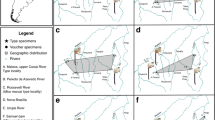Play all audios:

ABSTRACT IN 1958 Booth1 reviewed the zoogeography of West African primates and followed Rosevear2 in placing the Cross River as the western boundary to the range of three Central African
lorisoids. These were the angwantibo, _Arctocebus calabarensis_ (Smith), Allen's bushbaby, _Galago alleni_ Waterhouse, and the needle-clawed bushbaby, _Euoticus elegantulus_ (Le Conte).
Schwarz3,4 and Hill5 had previously speculated on the Niger as the western boundary, but Rosevear's knowledge of this particular area has given much weight to the theory of the Cross
River as a faunal barrier. Apparently unknown to Booth, however, angwantibos had been recorded before 1958 (refs. 6 and 7) from Owerri, Umuahia and Aba, which lie far to the west of the
Cross River, and Rosevear himself8 had recorded the animal in a collection brought to him from the Mamu Forest Reserve (see Fig. 1). Through field work in Elastern Nigeria* we have been able
to produce new and positive evidence on the distribution of the angwantibo and the bushbabies. Access through your institution Buy or subscribe This is a preview of subscription content,
access via your institution ACCESS OPTIONS Access through your institution Subscribe to this journal Receive 51 print issues and online access $199.00 per year only $3.90 per issue Learn
more Buy this article * Purchase on SpringerLink * Instant access to full article PDF Buy now Prices may be subject to local taxes which are calculated during checkout ADDITIONAL ACCESS
OPTIONS: * Log in * Learn about institutional subscriptions * Read our FAQs * Contact customer support SIMILAR CONTENT BEING VIEWED BY OTHERS AN INTEGRATIVE ANALYSIS UNCOVERS A NEW,
PSEUDO-CRYPTIC SPECIES OF AMAZONIAN MARMOSET (PRIMATES: CALLITRICHIDAE: _MICO_) FROM THE ARC OF DEFORESTATION Article Open access 02 August 2021 A BIOGEOGRAPHICAL APPRAISAL OF THE THREATENED
SOUTH EAST AFRICA MONTANE ARCHIPELAGO ECOREGION Article Open access 12 March 2024 RUMINANTS REVEAL EOCENE ASIATIC PALAEOBIOGEOGRAPHICAL PROVINCES AS THE ORIGIN OF DIACHRONOUS MAMMALIAN
OLIGOCENE DISPERSALS INTO EUROPE Article Open access 06 September 2021 REFERENCES * Booth, A. H., _Bulletin de l'I.F.A.N._, Ser. _A_, No. 2, 587 (1958). * Rosevear, D. R., _Checklist
and Atlas of Nigerian Mammals_ (Government Printer, Lagos, 1953). Google Scholar * Schwarz, E., _Ann. Mag. Nat. Hist._ (10), 7, 41 (1931). Article Google Scholar * Schwarz, E., _Ann. Mag.
Nat. Hist._ (10), 8, 249 (1931). Article Google Scholar * Hill, W. C. O., _Primates_, 1—_Strepsirhini_ (Edinburgh, 1953). * Cozens, A. B., and Marchant, S. M., _Nigerian Field_, 17, 116
(1952). Google Scholar * Pollard, W. G., _Nigerian Field_, 22, 120 (1957). Google Scholar * Rosevear, D. R., _Nature_, 174, 190 (1954). Article ADS Google Scholar * Matthews, L. H.,
_Nature_, 173, 907 (1954). Article ADS Google Scholar * Morris, D. J., _The Mammals_ (London, 1965). Google Scholar * Walker, E. P., _Mammals of the World_, 1 (Baltimore, 1964). Google
Scholar * Sanderson, I. T., _Animal Treasure_ (London, 1937). Google Scholar * Durrell, G. M., _The Overloaded Ark_ (London, 1953). Google Scholar Download references AUTHOR INFORMATION
Author notes * J. F. OATES & P. A. JEWELL Present address: Department of Zoology and Comparative Anatomy, University College, London AUTHORS AND AFFILIATIONS * Division of Biological
Sciences, University of Nigeria, Nsukka J. F. OATES & P. A. JEWELL Authors * J. F. OATES View author publications You can also search for this author inPubMed Google Scholar * P. A.
JEWELL View author publications You can also search for this author inPubMed Google Scholar RIGHTS AND PERMISSIONS Reprints and permissions ABOUT THIS ARTICLE CITE THIS ARTICLE OATES, J.,
JEWELL, P. Westerly Extent of the Range of Three African Lorisoid Primates. _Nature_ 215, 778–779 (1967). https://doi.org/10.1038/215778b0 Download citation * Received: 05 May 1967 *
Revised: 10 July 1967 * Published: 01 August 1967 * Issue Date: 12 August 1967 * DOI: https://doi.org/10.1038/215778b0 SHARE THIS ARTICLE Anyone you share the following link with will be
able to read this content: Get shareable link Sorry, a shareable link is not currently available for this article. Copy to clipboard Provided by the Springer Nature SharedIt content-sharing
initiative
